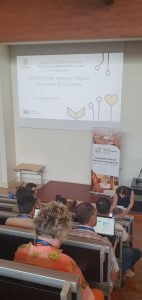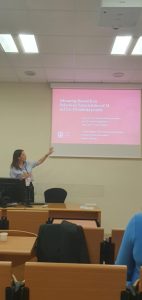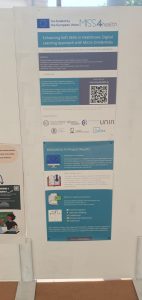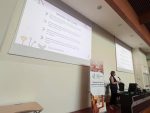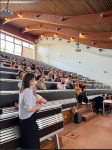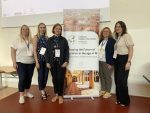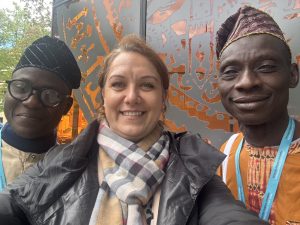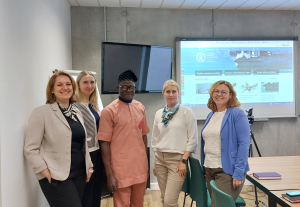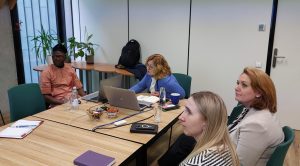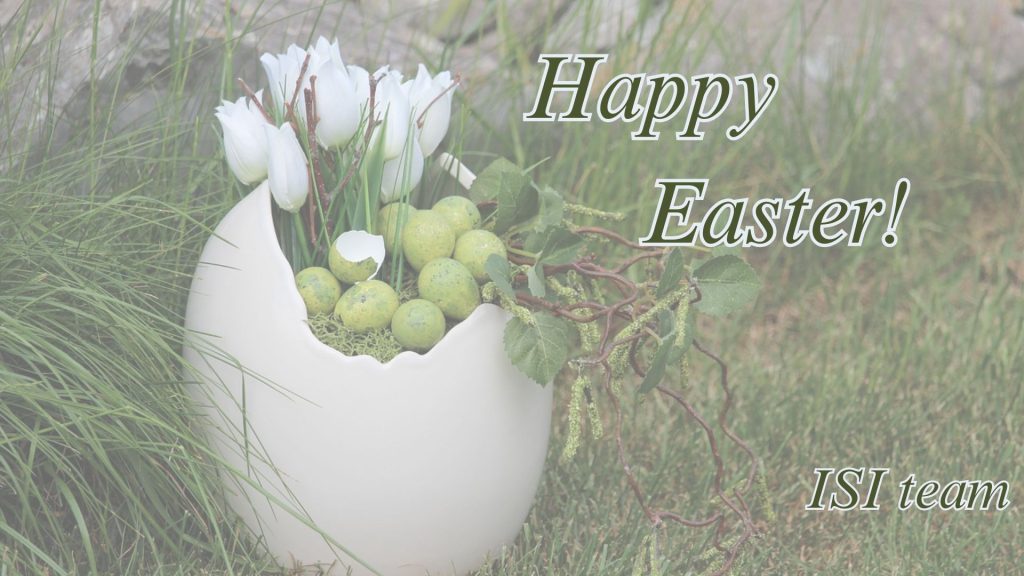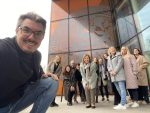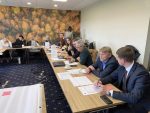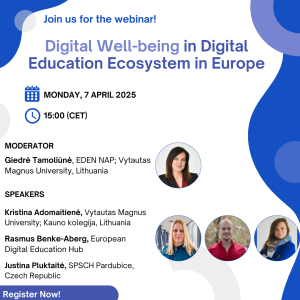ISI research team shares insights at Eden 2025 Annual Conference
On 15-17 June, the VMU ISI research team participated in the annual Eden 2025 Annual Conference, as it does every year.
This year’s conference, organised by EDEN Digital Learning Europe, took place at the oldest university in the Western world – the University of Bologna. As every year, the conference attracted a large number of participants from different countries and organisations around the world. The main theme was the future of education in the age of artificial intelligence. The conference explored topics such as the opportunities and challenges presented by generative artificial intelligence, recognising its potential for growth and innovation in education, while at the same time critically assessing the risks associated with it. The conference also presented different scenarios for integrating artificial intelligence into education, from personalised learning to global learning networks.
During various sessions and practical workshops, the ISI research team presented and shared their experience gained in implementing national and international projects:
- During the Windee presentation, practical workshops were held to discuss the fundamental intersection of technology and well-being in education.
- DI-dactics presented research on the loyalty and improvement of artificial intelligence and didactic properties.
- MISS4Health presented the project, its importance, objectives and expected results.
Digital Well-being at the EDEN Annual Conference 2025
On June 15-17, the Eden 2025 Annual Conference was held at the oldest university in the Western world – the University of Bologna. The EDEN Digital Learning Europe Annual Conference 2025 focused on the future of education in the age of AI. The conference explored the opportunities and challenges posed by generative AI, recognizing its potential for growth and innovation in education, while critically addressing the associated risks. The conference further presented different scenarios of AI integration in education, ranging from personalized learning to global learning networks.
However, digital well-being, its relevance in education, was also an integral topic at the conference.
VMU team has organised and moderated during the conference Action Lab: Defining Well-being in Digital Education Ecosystem.
Prof. Airina Volungevičienė presented a new policy experimentation project WINDEE – Well-being in Digital Education Ecosystem in Europe (no. 101195779 WINDEE — ERASMUS-EDU-2024-POL-EXP), the aim of which is to foster an environment where students can achieve digital well-being and maximise the benefits of technology in educational settings. After the presentation session, participants divided into groups and engaged in discussions.
The well-being of students and educators in digital education is one of the “must” conditions in the education ecosystem. Research claims that it is possible to find various ways to define the concept of digital well-being, and that the definition most probably will be dynamic and flexible depending on the perspective taken, but it looks like psychological, emotional, physical and social factors and the conditions ensured remain to be the main pillars in the majority of the discussions on the theme.
The Action lab was dedicated to work in groups to unpack the concept of well-being in digital education ecosystem and then to mingle together to set up the scene where person – specific, context – specific and device – specific factors request the setting up the context for learning and teaching in digital age in the way that students and teachers feel balanced to the extent potential.
All participants actived contributors to the joint picture and the definition of well-being in digital education ecosystem.
Workshop participants discussed and listed out factors and characteristics of digital wellbeing, defined what digital wellbeing is, and what it means for students and teachers.
The theme of the choice and decision-making in the balanced use of technologies was a recurring motif across group discussions
DISCLAIMER: “Funded by the European Union. Views and opinions expressed are however those of the author(s) only and do not necessarily reflect those of the European Union or the European Education and Culture Executive Agency (EACEA). Neither the European Union nor EACEA can be held responsible for them.”
WINDEE
A group of researchers organise the Action Lab in EDEN Bologna conference for Erasmus Policy Experimentation project WINDEE – Well-being in Digital Education Ecosystem.
The Action lab participants unpack the concept of well-being in digital education ecosystem and then mingle together to set up the scene where person – specific, context – specific and device – specific factors request the setting up the context for learning and teaching in digital age in the way that students and teachers feel balanced to the extent potential.
Introduction to the Action lab (slides) by prof. dr. Airina Volungevičienė
International Week highlight: a lecture by a lecturer from IBADAN University (Nigeria)
From 5-9 May, during the International Week, lecturers from various partner universities visit VMU University and give lectures to VMU students. The third-year students and lecturers of the Primary Education Pedagogy and Early Foreign Language Teaching programme of the Academy of Education, Assoc. Prof. Dr. Estela Daukšienė and Dr. Daiva Urmonienė, had a great opportunity to meet a lecturer from the exotic country Nigeria. Lecturer Matthew Taiwo Oni came from the prestigious IBADAN University (Nigeria), working at the Faculty of Education, Department of Early Childhood and Basic Education. IBADAN University is the oldest and one of the leading universities in Nigeria, founded in 1948 as a college of the University of London. It became an independent university in 1962 and remains one of the most prestigious in the country. It produces the largest number of postgraduate students in Africa, reflecting the university’s importance in the field of science and research on the continent. It is renowned for its strong academic tradition and its significant contribution to the country’s education and research.
In addition to introducing IBADAN University, Lecturer Matthew also gave a presentation on Bridging the Divide: A Comparative Analysis of AI Literacy among Public and Private Secondary School Teachers in Nigeria, where he presented his dissertation research. During his presentation, he shared his insights into the Nigerian teacher education system and revealed some important nuances. The research was of interest to the students listening, but it was even more interesting to hear about the work of teachers and their preparation in Nigeria in general. There was a strong emphasis on practice. Teacher education programmes in Nigeria place a strong emphasis on practical preparation. Prospective teachers spend a lot of time in schools, observing experienced colleagues and delivering lessons themselves under the supervision of mentors. The challenge of multilingualism is highlighted. Nigeria is a very diverse country with hundreds of different languages spoken. Teachers often face the challenge of teaching children whose mother tongue is different from the official language of instruction (English). Teacher training programmes therefore try to develop the skills to work effectively in a multilingual environment. Community involvement is also an important factor. Nigeria has a strong community role in education. Local communities are often actively involved in the management and support of schools, which is essential for educational achievement, and teachers are seen as important members of the community. Teacher training programmes encourage prospective teachers to develop close links with the community and to involve it in the educational process.
The lecture was useful for both students and Lithuanian teachers to understand the values Matthew conveyed about the importance of learning and the motivation to develop competences as an educator.
Happy Easter
Cult@intel – Digital Leaflet no 1.
The first Leaflet of Cult@intel project
Digital Well-being in the European Digital Education Ecosystem
On April 7th, the EDEN NAP organized a webinar “Digital Well-being in Digital Education Ecosystem in Europe,” dedicated to discussing the crucial intersection of technology and well-being in education Recognising the massive impact of digitalisation, which, while offering many opportunities, poses significant challenges to our overall health, the webinar explored the multidimensional nature of digital well-being. Digital well-being encompasses not only online safety but also the physical, mental, emotional, and social health of both students and teachers or lecturers. During the discussions, the importance of integrating digital well-being into teaching practices, developing digital competencies, choosing digital tools that offer solutions for ensuring well-being, and critically evaluating the positive and negative impacts of digital tools was emphasized.
The presenters participating in the seminar discussed this topic from different perspectives. Kristina Adomaitienė, a doctoral student at the Vytautas Magnus University (VDU) Education Academy, revealed the complex and multi-layered concept of digital well-being, emphasizing that its scope is much broader than just time spent in front of a screen. The event moderator, Giedrė Tamoliūnė, a member of the EDEN NAP Steering Committee and Associate Professor at VDU Education academy, presented a new policy experimentation project WINDEE – Well-being in Digital Education Ecosystem in Europe (no. 101195779 WINDEE — ERASMUS-EDU-2024-POL-EXP), the aim of which is to foster an environment where students can achieve digital well-being and maximise the benefits of technology in educational settings. Rasmus Benke-Aberg (Stifterverband, Germany) shared valuable initiatives and actions undertaken by the European Digital Education Hub community. Finally, Justina Pluktaitė (SPSCH Pardubice, Czech Republic) presented a practical approach to digital well-being, offering tangible insights on how to implement it. This seminar is an important contribution to planning research, policies, and practical strategies aimed at fostering a healthier, more balanced, and ultimately more effective digital learning experience in the European education ecosystem, highlighting its importance for global initiatives and the future of education.
The event recording is available on the EDEN DLE website: https://www.youtube.com/watch?v=AewLk1MalPI.
WINDEE – Well-being in Digital Education Ecosystem
![]()
On March 31 – April 1, VMU hosted a meeting of partners of the international, VMU-coordinated, EU policy experimentation project Well-being in Digital Education Ecosystem (WINDEE).
This is a meeting during which for discussions and debates about digital well-being in the education process. Questions were raised about what causes tensions in digitalization, how to reduce them, when is a digital balance, and what kind of help is needed for politicians, educational institutions, educators, parents of students, and children to achieve digital well-being in education.
Project partners:
- KIC – Knowledge Innovation Centre (Malta)
- TLU – Tallinn University (Estonia)
- UOC – Open University of Catalonia (Spain)
- EDEN – Digital Learning Europe (Estonia)
- EUN – PARTNERSHIP AISBL (Belgium)
- EDUCRAFTOR OY AB (Finland)
- NATIONAL AGENCY FOR EDUCATION (Lithuania)
Project associated partners:
- LieDM – Lithuanian Association of Distance and e-Learning (Lithuania)
- LKNUC – Lithuanian Educational Centre for the Deaf and Hard of Hearing (Lithuania)
- Stifterverband – Stifterverband fur die Deutsche Wissenschaft (Germany)
DISCLAIMER: “Funded by the European Union. Views and opinions expressed are however those of the author(s) only and do not necessarily reflect those of the European Union or the European Education and Culture Executive Agency (EACEA). Neither the European Union nor EACEA can be held responsible for them.”
EDEN NAP Webinar – Digital Well-being in Digital Education Ecosystem in Europe
We invite you to join us on EDEN NAP Webinar – “Digital Well-being in Digital Education Ecosystem in Europe“, April 7 at 15:00 (CET)
This webinar will focus on the critical aspects of digital well-being within the European education ecosystem, exploring research, policies, and practical strategies to create healthier, more balanced, and ultimately more effective digital learning experiences.
Registration: register now
More information here.
GenAI and Metacognition: Insights from the EDEN NAP Seminar
Discussions about generative AI in higher education often focus on its potential and applications, but there is a need for deeper research on its impact on learning. On February 27th, the EDEN Network of Academics and Professionals (NAP) held a webinar ‘Measuring Awareness of Using GenAI in University Studies: A Metacognitive Approach’ to address this important issue. The event was moderated by Dr. Giedrė Tamoliūnė, a member of the EDEN NAP Steering Committee and Associate Professor at VDU Education Academy.
You can watch the webinar recording on the EDEN YouTube channel.
The seminar featured presentations from:
- Prof. Dr. Josep M. Duart from the Open University of Catalonia (Spain) shared insights into how higher education institutions are responding to the challenges posed by artificial intelligence in their practices. He discussed the policies and initiatives universities are developing, and the challenges they face.
- Prof. Dr. Airina Volungevičienė, Professor at the VDU Education Academy and Director of the Institute for Study Innovations, presented theoretical insights raising awareness among educators, practitioners and researchers about the intersection among metacognitive strategies, learning, and artificial intelligence.
- Kateryna Harbarets, a second-year Master’s student in Educational Management at VDU Education Academy, continued the discussion by presenting her Master’s thesis research. The results of this research reveal how students engage with generative AI in higher education and how metacognitive strategies shape their awareness and use of these technologies.
Webinar participants discussed how and what teaching and learning strategies should be created, ensuring transparency in the use of GenAI and promoting metacognition.
The next EDEN NAP online seminar, “Digital Well-being in Digital Education Ecosystem in Europe,” will take place on April 7th at 15:00 CET. Register now!
EDEN NAP is a nearly 20-year-old EDEN network initiative, supporting collaboration and communication of experts in digital education across Europe and beyond in organizing webinars, discussions, and research activities.


